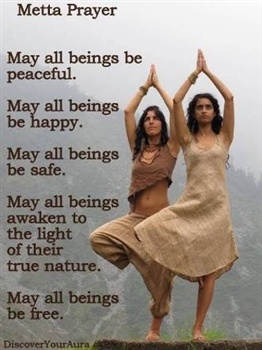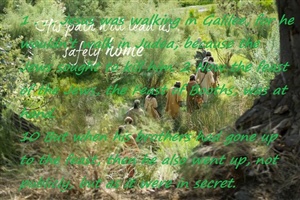Here is a list of Religion & Spirituality Blogs ordered by Most Viewed, posted by members. A Blog is a journal you may enter about your life, thoughts, interesting experiences, or lessons you've learned. Post an opinion, impart words of wisdom, or talk about something interesting in your day. Update your blog on a regular basis, or just whenever you have something to say. Creating a blog is a good way to share something of yourself with others. Reading blogs is a good way to learn more about others. Click here to post a blog.

The cure for religion,
Most of the cells in our bodies circulate harmlessly around doing there good work, that is until they turn cancerous, then like terrorists they're only aim in life is take over the body for there own ends & kill. If it were possible to stop that first cancerous cell from spreading that would equate to the cure would it not
How it could work - Nobody is stopped from believing what they like, they can pray if they choose or not if they don't, but what they can't do is spread their religion to others, not a mention of religion would be allowed, anywhere, this will not infringe on anyone's beliefs, nor would it end religion as god or Christ or whatever would still be able to talk to you personally
As religion would become just a personal thing there would be no need of churches, mosques etc, these would automatically become shelters for the homeless, the running of which would be funded by donations from people wishing to do so as they currently do paying for their house of prayers, religious organisations would become charities doing good work & funded as now. Everyone would be equal, the religion section would be removed from the CS profile for example, thus also removing another potential barrier between members
For me the question to be asked is, how many lives is your religion worth, one, a thousand, a million
Do you believe about Karma ?

Thought for the day...
But use it as a stepping-stone, as a jumping-board. And when you reach the climax of your sex o*gasm, become aware of what is happening, and you will be surprised — time has disappeared, mind has disappeared, ego has disappeared. For a moment there is utter silence. This silence is the real thing!"
osho
What say you?

The Law and the Prophets (Part 2 Final)
D. A. Carson explains:
There is a place for burning with anger at sin and injustice. Our problem is that we burn with indignation and anger, not at sin and injustice, but at offense to ourselves. In none of the cases in which Jesus became angry was his personal ego wrapped up in the issue. More telling yet, when he was unjustly arrested, unfairly tried, illegally beaten, contemptuously spat upon, crucified, mocked, when in fact he had every reason for his ego to be involved, then, as Peter says, “he did not retaliate; when he suffered he made no threats.”20 From his parched lips came forth rather those gracious words, “Father, forgive them, for they do not know what they are doing.”21 22
Jesus went on to give an illustration of what it means to live beyond anger and in reconciled relations with others.
So if you are offering your gift at the altar and there remember that your brother has something against you, leave your gift there before the altar and go. First be reconciled to your brother, and then come and offer your gift.
This illustration makes the point that reconciliation with another is more important than the sacredness of offering a sacrificial gift in the temple.23 Considering that Jesus spent most of His time preaching in Galilee, telling someone to leave their gift at the altar—which was in Jerusalem—and to reconcile with his brother who was most likely in Galilee, He was suggesting they do something that would have required about a week of travel! This reflects the importance Jesus placed on having a right relationship with others and taking decisive action, as needed, to repair such relationships.
Jesus followed with another illustration:
Come to terms quickly with your accuser while you are going with him to court, lest your accuser hand you over to the judge, and the judge to the guard, and you be put in prison. Truly, I say to you, you will never get out until you have paid the last penny.
In Jesus’ day, a person who didn’t pay his debts could be thrown into debtors’ prison until the money owed was paid. In saying “come to terms with your accuser before you go before the judge,” Jesus was stressing the urgency and importance of personal reconciliation, of finding peace in our personal relationships.
Scot McKnight wrote:
I am thinking we would do better to ponder the ordinariness of Jesus’ examples: immediately suspending what we are doing to find peace with our own relations. What comes to mind for me are the relations of husbands and wives, the relations of fathers and mothers to children, of sibling relations, and of the relations of neighbors and community members and those with whom we work. It is far too easy to ponder reconciliation of monstrous problems like those in Rwanda, than it is to ponder the day-to-day pursuit of peace and reconciliation in our own relations. Here’s the nub of the issue: we must be intentional about reconciliation for it to become a pervasive lifestyle. We must ponder those with whom we are not living fully reconciled lives, and those who may not even know that we are harboring bitterness and resentment. Reconciliation is not likely to be something that happens to us, as it is something we pursue.24
To summarize: In Matthew 5:21–26, Jesus gave the first of several examples of how the righteousness of those in the kingdom is to exceed the righteousness of the Pharisees. He tells His followers to avoid anger; and, when it arises, to let it go through reconciliation.
We should aim for health and wholeness among those in the kingdom.25
20 1 Peter 2:23 NIV.
21 Luke 23:34.
22 Carson, Jesus’ Sermon on the Mount, 44.
23 McKnight, Sermon on the Mount, 79.
24 Ibid., 83.
25 Talbert, Reading the Sermon on the Mount, 73–74.
Director's Corner TFI

What is it about…DEATH?
Many fear it.
Some people fight against it fiercely, whilst others embrace it willingly.
Vocabulary used to describe it includes such words as ‘foreboding’, ‘uncertain’, ‘mysterious’ and ‘final’. Imagery used to depict it is ugly, scary, and dark.
Is it really death that we fear, or is it what happens after? Or perhaps we fear what may sometimes happen before; such as pain and suffering from grave illness/sin?
The Bible often refers to death as ‘sleep’ or ‘rest’. Neither of these terms conjures images of dread for which we ought to fear. In fact, both describe a respite from work, an opportunity to relax and rejuvenate. So why, then, should I fear death?
Among other deaths, I have been a witness to my own mom’s passing, which has left me with many unpleasant memories. And whilst I believe that ‘theoretically’ we shouldn’t have any fears, the sad truth is that if our pain and suffering from something debilitating could end with either uncertain medical treatment or certain death, we may most likely choose the former, even though certain death would give us ‘rest’. What an enigma!
Is it that we are pre-conditioned to fear death and fight against it at all costs? Is it a part of our DNA so there’s no avoiding the fear?
Often, I feel that I may not ever be ready to die because pain and illness are sometimes horribly unbearable. But, if I had a choice in the matter, I would want to die quickly and painlessly. Unfortunately (or perhaps fortunately), when it comes to my deciding how, when and where I die, the choice is not really mine.

I have been thinking...( not again! Lol).

Because His hour had not yet come
John 7,1-2.10.25-30
1 After these things, Jesus was walking in Galilee, for He wouldn’t walk in Judea, because the Jews sought to kill Him. 2 Now the feast of the Jews, the Feast of Booths, was at hand.
10 But when his brothers had gone up to the feast, then He also went up, not publicly, but as it were in secret.
25 Therefore some of them of Jerusalem said, “Isn’t this he whom they seek to kill? 26 Behold, he speaks openly, and they say nothing to him. Can it be that the rulers indeed know that this is truly the Christ? 27 However we know where this man comes from, but when the Christ comes, no one will know where he comes from.”
28 Jesus therefore cried out in the temple, teaching and saying, “You both know me, and know where I am from. I have not come of myself, but He who sent me is true, whom you don’t know. 29 I know Him, because I am from Him, and He sent me.”
30 They sought therefore to take Him; but no one laid a hand on Him, because His hour had not yet come.
Thank you for reading.

The "defects" of Jesus (Part 5)
Not just in Jewish society at the time Jesus lived on earth, but in the our society today, it is difficult to accept "the decent people" to hang out with class was rated as "not decent people".
At that time, compatriot of Jesus notion that two types of people in particular that "not decent" was the tax collectors and sinners, especially the prostitutes. The sins which that time was considered unhealthy for those living body, such as lepers, disabled ... Those Pharisees were repeatedly to make questions about attitude of Jesus, and they were reminded the disciples of Jesus.
11 When the Pharisees saw this, they asked his disciples, “Why does your teacher eat with tax collectors and sinners?” (Matthew 9,11)
According to the Gospels record, not just Jesus goes to meet, greet, or reluctantly to be invited to eat, but really he had sought the tax collectors and sinners, made friends with them and eat with them.
Mr. Zacchaeus is the "head of the tax collector" (Lk. 19, 2); when he knew that Jesus would went through the city of Jericho, because worry about he would not be able to jostle with crowds of people, so he ran ahead, climbed a sycamore tree to see him, because he was very short. And then, when Jesus passed by, looked up at the tree, saw him and Jesus said immediately: “Zacchaeus, come down immediately. I must stay at your house today.” (Luke 19: 5).
And to explain the paradox of his attitude, Jesus himself said about his mission, “Healthy people don’t need a doctor—sick people do. Now go and learn the meaning of this Scripture: I want you to show mercy, not offer sacrifices. For I have come to call not those who think they are righteous, but those who know they are sinners.” (Matthew 9,12-13)
Luke 19:2-10
2 A man was there by the name of Zacchaeus; he was a chief tax collector and was wealthy. 3 He wanted to see who Jesus was, but because he was short he could not see over the crowd. 4 So he ran ahead and climbed a sycamore-fig tree to see him, since Jesus was coming that way.
5 When Jesus reached the spot, he looked up and said to him, “Zacchaeus, come down immediately. I must stay at your house today.” 6 So he came down at once and welcomed him gladly.
7 All the people saw this and began to mutter, “He has gone to be the guest of a sinner.”
8 But Zacchaeus stood up and said to the Lord, “Look, Lord! Here and now I give half of my possessions to the poor, and if I have cheated anybody out of anything, I will pay back four times the amount.”
9 Jesus said to him, “Today salvation has come to this house, because this man, too, is a son of Abraham. 10 For the Son of Man came to seek and to save the lost.”
(Blog continues in comments section)

What about before
What about it? If you are a miserable bastard today and believe you have never wronged anyone, maybe it is payback for something a 1000 years ago. Or, maybe you are just an idiot and failed to see something from somebody's perspective eye whom you put tears in.
Anyway, where is Robert? I was waiting for part II.
A Blog is a journal you may enter about your life, your thoughts, interesting experiences, or lessons you have learned. It's your own page on Connecting Singles that you can update on a regular basis, or just whenever you have something to say. You can write about an opinion, impart words of wisdom, or talk about something interesting in your day. Creating a blog is a good way to share something of yourself with Connecting Singles members. Reading blogs is a good way to learn more about members you have met here. Please be sure to read the blog rules before posting.
Would YOU like to post a blog on Connecting Singles? Have you written blogs that you'd like to share with other members? Posting your blogs shows your skill and creativity and helps members get to know you better. Your blog will appear on the Connecting Singles Blogs page and also in a link on your profile page. Click here to post a blog »



